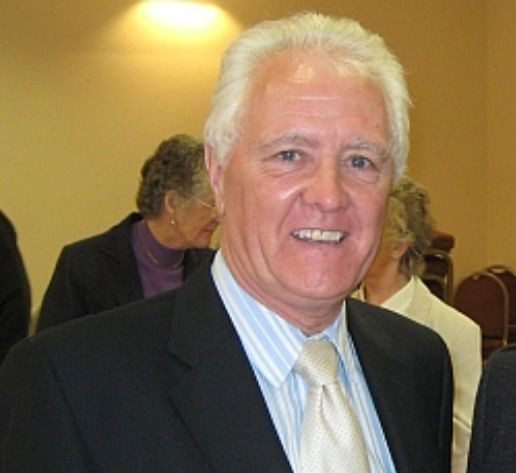
At the Financial Services Club in Central & Eastern Europe (FSClub CEE) meeting, you may be wondering what John McFall doing there.
The meeting was held at the British Embassy, our usual location for these meetings, and coincided with a tour of the region by some members of the Treasury Select Committee, who had spent the day with the European Central Bank to hear their concerns and priorities – “risk”, “moral hazard”, “recovery”, etc – and those of other countries in the region including Austria and Hungary.
Several members attended our little conclave including Nick Ainger, Andrew Tyrie and Sir Peter Viggers.
Meantime, John McFall kindly agreed to join the panel – he last spoke at the Financial Services Club in September 2004 - and was asked to explain a bit about the work of the Treasury Select Committee to the assembled throng.

Here’s what he said (loosely written, so none of this should be taken as direct quotation):
The UK Treasury Select Committee is a Governmental Select Committee established to look at the future of banking in 1989. It has particularly made progress since 1997, when the Bank of England was separated from the Treasury, as it is now playing a key role in scrutinising the activities of the Treasury, the Bank and the FSA.
We have been sitting near enough in permanent session since the collapse of Northern Rock in August 2007, and ours has been the only body to sit as a direct interaction between Parliament and the public in terms of how we are able to communicate the issues to the people.
For example, we had the Chancellor of the Exchequer, the Governor of the Bank and the Head of the FSA appearing together before the committee recently and our website received over 6,000 questions from the general public just for that one meeting.
This shows that they are so interested in this issue, and we give them a voice to talk to the tripartite authorities that run the financial system.
We focus upon financial stability and have established new financial stability procedures.
There are two issues here that we are particularly concerned with. First, the excessive attitude towards risk that we have seen over the past decade, as epitomised by HBOS and particularly the lending practices of the Bank of Scotland; and the lack of corporate governance in the sector, as shown specifically by the Royal Bank of Scotland’s Fred Goodwin.
This resulted in the new Banking Bill as announced in the Queen’s speech last month, which will give the FSA stronger powers and as this is meant to be “more intrusive regulation.”
Another big issue is what we call “regulatory badging”, where a company can stand back from their operations and duties of governance by saying, if it gets into a mess, that it is the fault of the FSA. This is why the area of corporate governance still needs addressing further.
With regards to the future, in the New Year we are going to be looking at the potential for “narrow banking”. Last year, this fell off the agenda when Lord Turner (the Chairman of the FSA) gave his report, but we want to bring this discussion back.
The focus of the narrow banking review will be to find the answer to the question of how to avoid the public taxpayer having to pick up the tab if the financial markets go wrong.
In other words, whether we need to be bring back the Glass-Steagall divide or not.
Mervyn King, the Governor of the Bank of England, has lobbied for the
return of the Glass-Steagall Act - the post-Depression legislation in
the USA that separated investment and retail banking, repealed in 1999
by the Gramm-Leach Bliley Act.
This way we could let an
investment bank fail whilst the remainder - the payments processing,
retail and commercial parts of the bank which must not fail - could be
protected.
Lydia later asked John how the crisis had changed the UK’s views of its financial system in the context of European trade.
For the past ten years, the UK’s growth strategy for trade and investment has focused on financial institutions’ profits rather than their risks, but the UK trades in far more than just finance.
For example, the UK has a major range of service sectors and is the largest exporter of services in the world covering financial services, but also media and culture, construction and architecture, and more.
Take hi-tech engineering services as an example, and you will see that there is a trade balance between Britain and Germany. This reflects that we get their BMW’s, and they get our JCB’s.
So the financial crisis has given us a chance to look at this range of services and consider how we might go around rebalancing this portfolio of services to reflect a more even spread across all the sectors rather than the ballooning effect that financial services had on our portfolio.
In this sense, Adam Smith’s hand – both his visible and invisible hand - has been driving the market.
And with this we need to remember that globalisation is the shadow behind all of these issues. This means that in the hi-tech and services areas, we believe that the UK has a major opportunity to compliment what they are doing in China and elsewhere in the world for export purposes.
Chris M Skinner
Chris Skinner is best known as an independent commentator on the financial markets through his blog, TheFinanser.com, as author of the bestselling book Digital Bank, and Chair of the European networking forum the Financial Services Club. He has been voted one of the most influential people in banking by The Financial Brand (as well as one of the best blogs), a FinTech Titan (Next Bank), one of the Fintech Leaders you need to follow (City AM, Deluxe and Jax Finance), as well as one of the Top 40 most influential people in financial technology by the Wall Street Journal's Financial News. To learn more click here...


